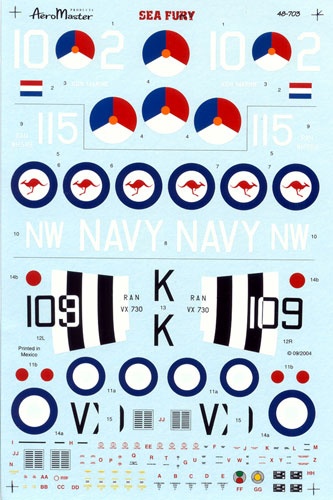48-703 is the second of two new sheets from
AeroMaster that gives you markings for the Hawker Sea Fury.
The
sheet carries markings for three machines, two Aussie ones and one from
the Royal Netherlands Navy. The individual aircraft and their markings
are as follows:
 Sea
Fury FB 51 10-2, a Fokker built (under licence) machine of 860 Squadron
Royal Netherlands Navy in 1950. The aircraft is in early the early Sea
Fury camouflage scheme of low demarcation extra dark sea grey over sky
with a sky spinner. The supplied markings comprise:
Sea
Fury FB 51 10-2, a Fokker built (under licence) machine of 860 Squadron
Royal Netherlands Navy in 1950. The aircraft is in early the early Sea
Fury camouflage scheme of low demarcation extra dark sea grey over sky
with a sky spinner. The supplied markings comprise:
Sea
Fury FB 11 WH589 of 724 Squadron Royal Australian Navy Fleet Air Arm.
The markings depict the machine as it appeared in 1953. The machine is
in overall oxford blue with a white spinner (the placement guide shows
it as silver) and a white canopy frame and all of its markings in
white. The supplied markings comprise:
-
National insignia
in six places. These are poorly done as the kangaroo looks more
like the fat-arsed wombat we have seen used by decal manufacturers
ever since Esci first started producing them in their early kits!
-
WH589 serial.
-
Base Letters NW –
signifies Naval Air Station Nowra.
-
Large Navy titles.
-
115 Fleet Number.
Much has been written about this aircraft and decals
for it have been produced by other companies as well. The constant
theme is that they all wore the same basic overall oxford blue scheme
but with different details at different times. The spinner has been
noted as white, red and silver as well as oxford blue. The canopy from
(sliding portion) has also been seen as white as well as oxford blue. I
guess it all comes back to the old modelling adage – model the machine
to the photographs you have of it.
The
final option is VX730 of 805 Squadron Royal Australian Navy Fleet Air
Arm. The markings depict the machine when it was aboard HMAS Sydney
during the Korean War. The aircraft is in the standard Royal Navy Fleet
Air Arm camouflage scheme of extra dark sea grey over sky with a red
spinner. RAN aircraft sourced from the UK retained the RN Fleet Air Arm
camouflage during this conflict and for a long time after. The supplied
markings comprise:
-
Type D national
insignia in six places. These are supplied with the red centres as
separate decals to counter register problems – none on my sample.
-
RAN titles.
-
Black and white
theatre bands incorporating the 109 Fleet Number and VX730 serial
number. The reproduction of the way the numbers have been applied
over/on the theatre bands really is excellent and it faithfully
replicates the 1 to 1 scale version.
-
Fragmented large
VX730 serial for the under sides of the wings.
-
Base Letter K –
signifies the carrier HMAS Sydney.
-
805 squadron
insignia.
A
real plus with these two sheets is that a very substantial set of is
supplied. This data is very evident on Fleet Air Arm machines (there is
a photo of VX730 running up aboard HMAS Sydney on page 40 of the Robert
F. Dor/Warren Thomson book The Korean Air War and it clearly shows the
extent of the stencil data so it is very much welcomed. Stencil data
and manufacturer's logos are also supplied for each of the five
propeller blades and the drop tanks. Other welcome items are the decals
that simulate the louvered panels on the undersides of the wing. These
are missing on the Hobbycraft kit and would be a real bear to try and
simulate in 1/48 scale, and the decals that simulate the underwing
navigation lights again, missing on the kit.
The
placement guide is A-4 in size and it shows full colour left-hand side
profiles of all three options as well as plan views of the tops and
bottoms of the wings, and comprehensive drawings to guide to the
placement of stencil data.
The
decals themselves have been "Printed in Mexico". Everything is in
perfect register and sharply printed.
The
decals and placement sheet come packed in a clear plastic zip-loc bag.
The
suggested kit is the Hobbycraft one – the only injected one in town!
All said and done though it is not too bad a kit really as it provides a
good outline but lacks details. The aftermarket has taken up the cudgel
though and resin, photo-etch and white metal detail sets abound for this
kit.
The
only things really missing from this, as well as the other Sea Fury
sheet are the black and white theatre bands. AeroMaster gives you the
fuselage ones so why not the wing ones?
Recommended.
Home | What's
New | Features
| Gallery |
Reviews | Reference
| Forum
| Search